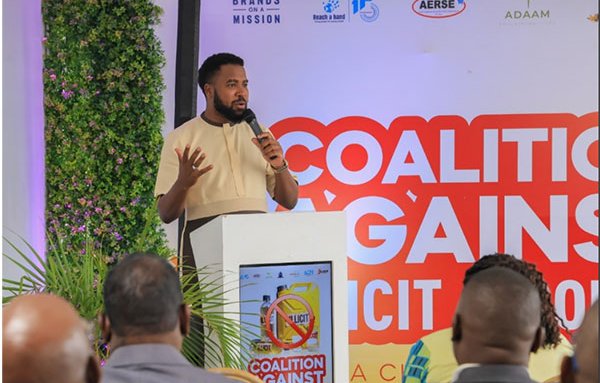Kampala, Uganda | The devastating effects of illicit alcohol continue to tear through Ugandan communities claiming lives, breaking families, and draining the nation’s potential. From makeshift rural distilleries to unregulated spirits sold on city streets, the problem has quietly grown into a public health emergency. A white paper titled “Public Health Implications of the Harmful Consumption of Illicit Alcohol in Uganda,” published by Arrow Empirical Research & Skills Enhancement Co. Ltd (AERSE) with data from Euromonitor International, reveals that illicit alcohol now accounts for nearly 67 percent of total consumption in Uganda. Much of it is produced and sold without regulation, often containing smuggled ethanol and toxic contaminants.
In response to this escalating crisis, leading Ugandan institutions spanning government, civil society, faith-based groups, youth organizations, academia, media, and the private sector have united to form a national movement known as the Coalition Against Illicit Alcohol, Uganda Chapter (CAIA–Uganda). The Coalition seeks to coordinate action, increase public awareness, and strengthen policies that protect Ugandans from the health and social dangers of illicit spirits.
Uganda joins its neighbor Zambia, where a similar coalition launched two years ago has successfully mobilized government, retailers, and communities to combat the harmful consumption of unregulated alcohol. Inspired by that model, the Ugandan coalition will operate as a neutral, evidence-based platform focused on collaboration, accountability, and sustainable change.
The inaugural meeting of CAIA–Uganda took place on October 29, 2025, at the Reach A Hand Uganda (RAHU) offices in Lunguja, Kampala. The event drew an influential mix of participants, including former Prime Minister Dr. Ruhakana Rugunda; Rose Obigah, Member of Parliament for Terego District; and representatives from the Ministry of Health, Uganda Police Force, Uganda Revenue Authority, Next Media, Africa Anti-Counterfeit Network, and the Uganda Alcohol Industry Association.
Delivering the keynote address, Dr. Rugunda described illicit alcohol as a national emergency requiring coordinated response. “Regulation is not a matter of choice but of necessity,” he said. “Without stronger laws and enforcement, Uganda risks losing a generation of its most productive citizens to addiction, accidents, and preventable deaths. Government and civil society must walk hand in hand to protect our people.” He praised the coalition’s inclusive approach, calling it “a powerful national movement capable of influencing policy and shaping public behavior.”
In a moving address, Rose Obigah shared how she lost her father to illicit alcohol while still in school a tragedy that drives her advocacy today. “Illicit alcohol is not just a social or economic issue; it is a human tragedy that has destroyed countless families like mine,” she said. “The Alcohol Control Bill is not merely a legal reform but a lifesaving measure to protect families, restore dignity, and safeguard our nation’s future.”
Dr. Myriam Sidibe, Co-Chair of the Coalition, reflected on the broader mission behind the movement. “Illicit alcohol is not merely a health issue; it is a mirror reflecting inequity, grief, and misinformation,” she noted. “In Zambia, when people, institutions, and brands came together, we saw attitudes shift and lives change. Today, Uganda takes that same brave step to confront a hidden epidemic with unity and evidence.”
Humphrey Nabimanya, Founder and CEO of Reach A Hand Uganda, emphasized youth leadership as central to the coalition’s vision. “Almost every Ugandan family has a story of loss due to illicit alcohol,” he said. “Our goal is to ensure what is consumed is safe, regulated, and standardized. We will integrate this campaign into all our youth programs across 63 districts because the future of this nation depends on it.”
Faith-based and community leaders echoed the moral dimension of the fight. Reverend Nathan Mugalu Balirwana stressed that addressing illicit alcohol requires social, economic, and spiritual renewal. “Faith-based leaders have a moral responsibility to guide and educate communities,” he said. “To create lasting change, we must tackle root causes such as idleness, unemployment, and weak mentorship structures that leave many young people vulnerable.”
The private sector also voiced strong commitment. The Uganda Alcohol Industry Association called for greater accountability among producers and distributors. “Industry players must comply with standards set by government,” a representative said. “Without proper regulation and enforcement, dangerous products will continue to infiltrate our communities and that must stop.”
The launch concluded with attendees signing a Coalition Pledge Board, symbolizing their shared resolve to act. In her closing remarks, Dr. Sidibe underscored the coalition’s long-term vision: “This movement is not just about health it is about dignity, opportunity, and the kind of country we want to live in. Together, we can protect life, inspire change, and rise above.”
Moving forward, the Coalition Against Illicit Alcohol, Uganda Chapter, will pursue a national agenda focused on prevention, advocacy, and reform. Its priorities include rolling out public education campaigns to raise awareness about the dangers of illicit spirits, launching faith-based and community outreach programs to mobilize local action, and strengthening policy and enforcement partnerships to ensure safer, regulated alcohol consumption nationwide.
